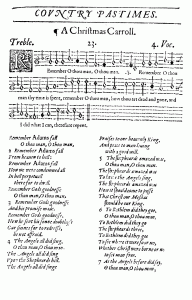Our service will open with one of the most familiar of Advent hymns, “O come, O come, Emmanuel.” This hymn conveys ancient texts in the life of the Church, but its recovery within English-Language hymnody is in large measure thanks to priest-poet-translator John Mason Neale (1818-1866). His involvement with the Oxford Movement led to efforts to restore to more common use a number of profound hymns from the Church’s first millennium.
The Introit chanted (or said) on the third Sunday in Advent is from the 4th chapter of St. Paul’s letter to the Philippians: “Rejoice in the Lord alway: and again I say, Rejoice.” If our choir chanted that text in Latin, the first word you would hear would be Gaudete, which is why this Sunday was traditionally known as Gaudete Sunday. It is a day that emphasizes the joy that Advent announces. In the Anglican tradition, we call it Rose Sunday, a designation reflected in the color of the vestments and of the candle lit this Sunday on our Advent wreath.
Our Sermon hymn this week is “Hark! the glad sound! the Saviour comes.” The text to the hymn is by Philip Doddridge (1702-1751), who also wrote the communion hymn, “My God, thy table now is set ” (#203) and “Awake, my soul, stretch every nerve” (#577). When the text for “Hark! the glad sound” was originally published, it bore the caption: “Christ’s Message, from Luke 4:18-19.” The editors of our Hymnal omitted three of Doddridge’s original stanzas:
On him the Spirit largely poured
Exerts its sacred fire;
Wisdom and might and zeal and love
His holy breast inspire.
He comes from the thick films of vice
To clear the mental ray
And on the eye-balls of the blind
To pour celestial day.
His silver trumpets publish loud
The jubilee of the Lord
Our debts are all remitted now
Our heritage restored.
The tune to which we sing this hymn, BRISTOL, is taken from The Whole Book of Psalmes, published in 1621 and edited by Thomas Ravenscroft (c. 1592-1635).
Our Offertory anthem this week is a recent composition by Charles Giffen, who used to sing in the choir of another parish here in Charlottesville; he was then teaching mathematics at UVA. In 2009, Giffen set to music a lovely and haunting poem by Christina Georgina Rossetti (1830-1894) called “Advent (1858).” His setting takes its title from the first line of Rossetti’s poem, “This Advent moon shines cold and clear.”
 The choir’s Communion motet, ”Remember, O thou man,” is taken from another publication edited by Thomas Ravenscroft, his 1611 Melismata: Musicall Phansies Fitting the Court, Citie, and Countrey Humours, to 3, 4, and 5 Voyces. The original setting was called “A Christmas Carroll” (at the left is a page from that 1611 publication). It included (as you can see if you squint really hard at the image) verses suitable for Advent and Christmas, but we’ve excised the Christmas verses for use this Sunday.
The choir’s Communion motet, ”Remember, O thou man,” is taken from another publication edited by Thomas Ravenscroft, his 1611 Melismata: Musicall Phansies Fitting the Court, Citie, and Countrey Humours, to 3, 4, and 5 Voyces. The original setting was called “A Christmas Carroll” (at the left is a page from that 1611 publication). It included (as you can see if you squint really hard at the image) verses suitable for Advent and Christmas, but we’ve excised the Christmas verses for use this Sunday.
Our closing hymn is new to us. “The Advent of our King” was written by the French priest and educator Charles Coffin (1676-1749). For a time rector of the University of Paris, Coffin wrote about 100 Latin hymns. I have chosen to set it to the tune HEATH, named for hymn-writer George Heath (c.1745-1822). This hymn tune is also known as SCHUMANN, as one of its publishers attributed it to the great German composer. His widow, Clara, doubted this attribution.